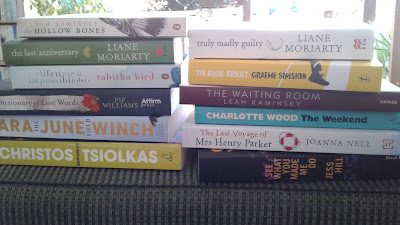I wasn't able to travel using my passport or, for several weeks, venture further than 5 km from my home, but reading took me to many parts of Australia, New Zealand, India, United States, UK, France, Sweden, Israel, Afghanistan, Kenya, Nigeria with brief visits to Thailand and Indonesia, Ethiopia and Brazil as well as in transit from Syria to UK.
Most of my reading was set in recent years but I also travelled back to the early nineteenth century, late nineteenth century, the early twentieth century, 1920s, the 60s and even did a bit of time travel back and forth and into the future.
My reading has been largely catching up with the dozens of fabulous Australian authors I'd not come across before, indeed, some of my reading being debut novels just out. Women authors far outweighed males in my choices, not because I was aiming to read women, (or avoid men,) but because their books appealed to me.
I've also read many more short stories and flash fiction than usual in online journals. While I read some brilliant flash fiction and short accounts of people's Covid lockdown experiences on 100wordsofsolitude and The Cabinet of Heed's stream-of-consciousness-special (and had a piece of mine published in the latter) I tended to avoid these after a while, opting for non-related themes.
Here are the twelve books That came top in my enjoyment rating.
Vikram Seth: A Suitable Boy
Pip Williams: The Dictionary of Lost Words
Leah Kaminsky: The Hollow Bones
Leah Kaminsky: The Waiting Room
Charity Norman: The Secrets of Strangers
Christina Dalcher: Q
Delia Owens: Where The Crawdads Sing
Tara June Winch: The Yield
Leah Purcell: The Drover's Wife
Inga Simpson: Where The Trees Were
Craig Silvey: Jasper Jones
Joanna Nell: The Great Escape From Woodlands Nursing Home
And in case the worst happens and we get another lockdown, I still have War and Peace on my shelf and I was given an epic 933 pager for Christmas, Shantaram by Gregory David Roberts. Let's hope I can read them without any constraints around me, although neither will be my first choice to read on the train as they won't fit in my bag.







